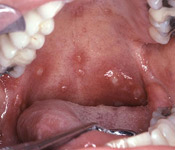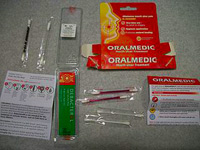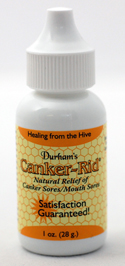Most of the time trying some simple home remedies for canker sores can resolve your ulcers. But there are a few instances where some people may need medical help. Professional medical care is recommended for those suffering from moderate to severe mouth sores, for example, lesions that are so painful you have difficulty talking or eating or extremely large ulcers. If you have mouth sores that are 12mm or larger with irregular edges, they are likely the type of canker sore called Major Aphthae. Since these can take up to six weeks to heal and have a higher probability of scarring, it would be advisable to see a doctor for treatment.
 When you see your doctor or dentist, there is a variety of treatments they may prescribe. Listed below are a few of the most common.
When you see your doctor or dentist, there is a variety of treatments they may prescribe. Listed below are a few of the most common.
Silver Nitrate
– One of the simplest treatments that has generally good results for relieving the pain is a silver nitrate stick. This is actually chemical cautery, meaning the ulcer is chemically burned. The substance is swabbed on the ulcer which cauterizes it, and a kind of kind of skin or film forms over it. Most people experience pain relief pretty quickly, although when the silver nitrate is applied it will likely burn for a few seconds. The sore usually heals within three to five days. Some people report they get a burnt taste in their mouth following application. You can buy silver nitrate online as it is non-prescrption.
Debacterol – This prescription medicine is a combination of sulkfonated phenolic compounds and sulfuric acid. Like the silver nitrate, it cauterizes the mouth sore by burning it. It can provide quick relief and sores generally heal within 3-5 days.
Triamcinolone Acetonide – This is a prescription-only anti-inflammatory ointment commonly known as Kenalog in Orabase. The ointment can be used up to three times daily to help reduce inflammation and prevent further irritation. It is not known to speed up the healing process, but it can provide some pain relief. The problem is keeping the medicine in place without it coming off. Recommendations are to apply it after meals and at bedtime.
Viscous Lidocaine – A prescription-strength numbing agent in a gel form that you apply to the sores several times a day. The downside is that it is potentially toxic, so you need to avoid swallowing it, which may be pretty hard to do when applying it to the inside of your mouth. It certainly wouldn’t be advisable to use it if you have a canker sore on your tongue.
Dexamethasone Mouth Rinse – Some doctors or dentist prescribe this mouthwash to help reduce pain and inflammation.
Corticosteroids – Oral corticosteroids similar to Prednisone may be prescribed in extremely severe cases, but usually only as a last resort when the patient is not responding to other treatments. Corticosteroids can have serious side effects such as suppressing the immune system, thinning the skin, weight gain, brittle bones and other risks.
Tetracycline Suspension – This is an antibiotic used as a mouthwash. Some common names for it include Panmycin, Tetracap and Achromycin. It may alleviate pain and reduce the healing time. This is a somewhat controversial treatment and should only be used as a short-term therapy; if used for more than five days it has been known to cause thrush, a oral fungal infection that, ironically, causes painful mouth sores. It can permanently discolor children’s teeth.
Thalidomide – This much-maligned drug known for causing birth defects is only used for limited purpose; one of them is for treating canker sores in HIV-positive patients. There are many other medicines that have been used to treat mouth ulcers, but they have potentially major side effects and are costly. These include Remicade, Enbrel (used for treating rheumatoid arthritis), the heartburn drug Cimetidine (Tagamet) and Interferon. Colchicine, an immune system suppressant is that normally used to treat gout, has also been used, but the unfortunate side effect is diarrhea.
When to Seek Medical Help
If lesions are present for more than two weeks, if you experience frequent outbreaks, or mouth ulcers are so painful you cannot eat or have difficulty talking, it’s likely that home remedies aren’t going to help and it’s time to seek professional medical care. You need to to be sure that you don’t have a condition that mimics canker sores, an immune system abnormality or food sensitivity that could be the underlying cause for your mouth sores. You doctor may want to conduct a food survey to check for potential allergens or blood tests to rule out systemic causes.




